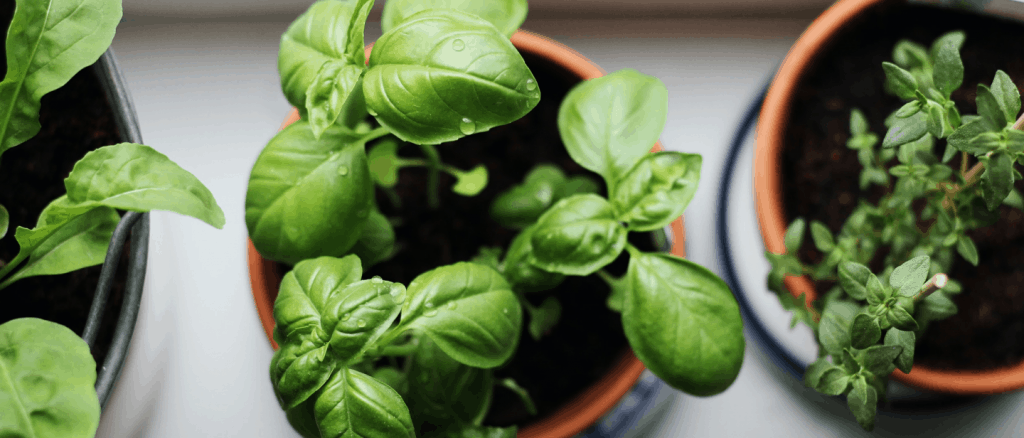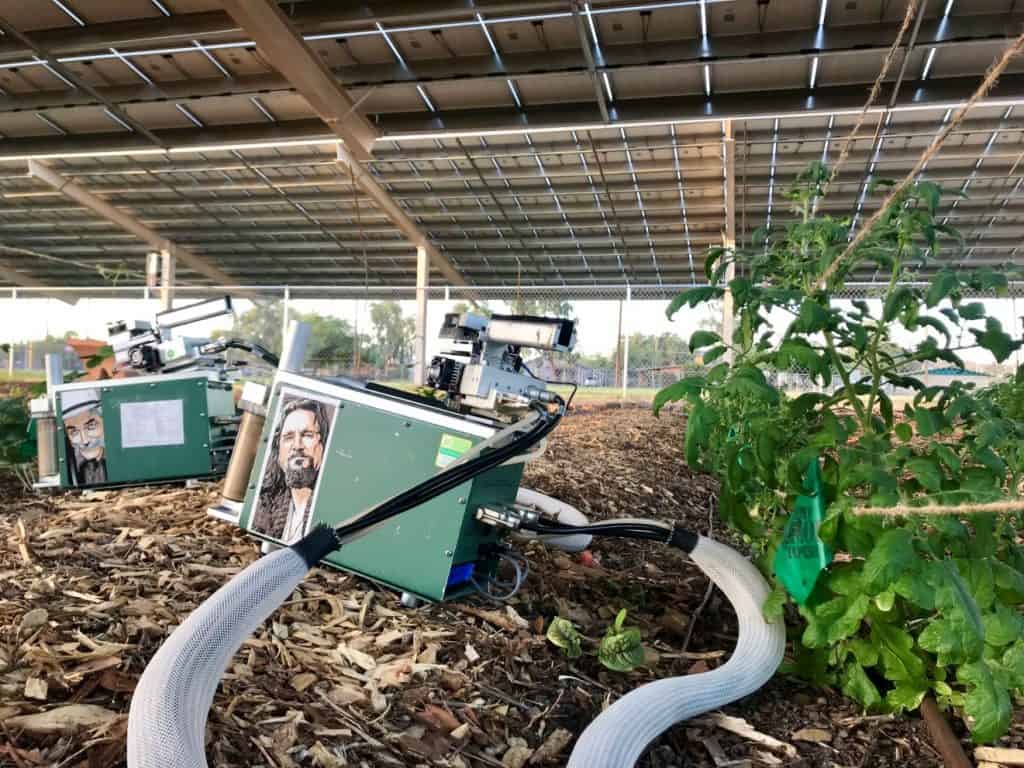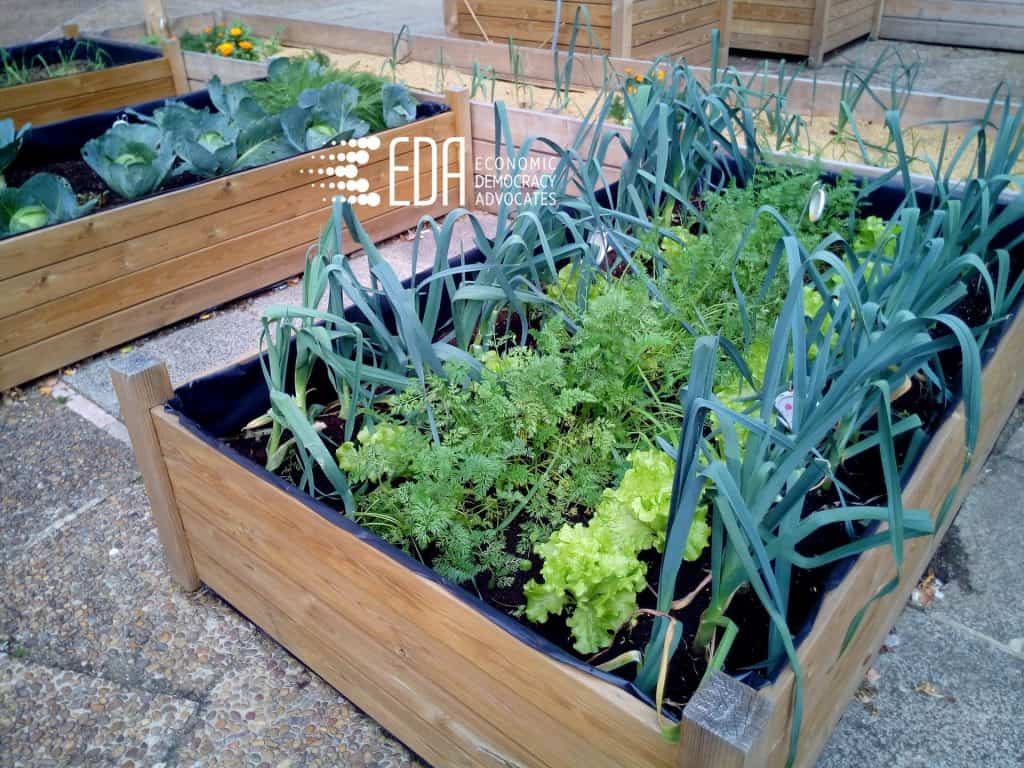Food insecurity is an issue all around the world. Many scientists are focusing on ways to make home gardening more foolproof. When we can grow our own food, we can begin to feel that we have control over our future.
This article reveals the work of one scientist who has developed a tool to “talk” with plants, and learn exactly what that plant needs to survive indoors. With a micro-chip design, he is able to measure all of the necessary environmental elements to support plant growth.
While this work was originally focused on hydroponic gardening, the technology is now being applied to more traditional farms where “normal” farming techniques have depleted select nutrients in the soil due to over use of fertilizers. Both applications of this man’s work will go a long way to help feed the more than 800 million people around the world who go hungry. It is creativity like this that will help us to sustain our growing population. 
 I meet Keenan Pinto at Space10, an IKEA-backed future-living lab in Copenhagen, where the 27-year-old bioengineer helped build Sprout, an application on Google’s AI platform that facilitates “dialogue” between people and plants. It’s like Siri for hydroponics. Inside a tiny pink-hued room sit trays of soilless plants equipped with sensors, which communicate with a server and a chatbot that “talks” through a small speaker. Pinto says, “Hey, Google, let me talk to Sprout,” and a female voice answers, “Hello, everyone, welcome to the Farm.” Pinto asks the bot what it does, and “she” responds: “I monitor parameters like the pH level, nutrient level, light, humidity and temperature. Do you want to know more about anything specific?” Users can ask any question about what the plants need to thrive and Sprout provides answers based on data Pinto has fed into the program.
I meet Keenan Pinto at Space10, an IKEA-backed future-living lab in Copenhagen, where the 27-year-old bioengineer helped build Sprout, an application on Google’s AI platform that facilitates “dialogue” between people and plants. It’s like Siri for hydroponics. Inside a tiny pink-hued room sit trays of soilless plants equipped with sensors, which communicate with a server and a chatbot that “talks” through a small speaker. Pinto says, “Hey, Google, let me talk to Sprout,” and a female voice answers, “Hello, everyone, welcome to the Farm.” Pinto asks the bot what it does, and “she” responds: “I monitor parameters like the pH level, nutrient level, light, humidity and temperature. Do you want to know more about anything specific?” Users can ask any question about what the plants need to thrive and Sprout provides answers based on data Pinto has fed into the program.
By fusing biology, electronics and artificial intelligence, Pinto set out to make it super easy for novice gardeners to grow food hydroponically and take a whack at food insecurity. Space10 co-founder Simon Caspersen says the lab is continuing to test Sprout, which will make its official debut September 18–23 at the London Design Festival. Meanwhile, Pinto recently moved to China to grow a different kind of AgTech through his new startup Nordetect. Accepted into Shenzhen’s competitive HAX Accelerator, he and two partners have three months to scale their “lab on a chip,” designed to help farmers in countries around the world where soil has been depleted by decades of fertilizer abuse.  Synthetic fertilizers were first manufactured in early 20th-century America and introduced to India in the late ’60s and ’70s during the “Green Revolution.” The objective was to boost agricultural output by introducing high-yield seed varieties that required costly fertilizers and pesticides to survive, but according to activist and author Dr. Vandana Shiva, this approach had the opposite effect: It stripped the soil of vital nutrients and reduced biodiversity. In The Violence of the Green Revolution, she writes, “Instead of abundance, Punjab has been left with diseased soils, pest-infested crops, waterlogged deserts and indebted and discontented farmers.” Pinto agrees that “capitalist fertilizer companies” pushing their products on farmers have had a ravaging impact on soil ecology. Today, he says, governments in countries like India and China mandate soil testing to manage fertilizer levels but current testing methods are ineffective and prohibitively expensive. “Soil is a living thing,” he explains, “so when samples come back from the lab two weeks later, the soil has already changed, and those results are invalid.”
Synthetic fertilizers were first manufactured in early 20th-century America and introduced to India in the late ’60s and ’70s during the “Green Revolution.” The objective was to boost agricultural output by introducing high-yield seed varieties that required costly fertilizers and pesticides to survive, but according to activist and author Dr. Vandana Shiva, this approach had the opposite effect: It stripped the soil of vital nutrients and reduced biodiversity. In The Violence of the Green Revolution, she writes, “Instead of abundance, Punjab has been left with diseased soils, pest-infested crops, waterlogged deserts and indebted and discontented farmers.” Pinto agrees that “capitalist fertilizer companies” pushing their products on farmers have had a ravaging impact on soil ecology. Today, he says, governments in countries like India and China mandate soil testing to manage fertilizer levels but current testing methods are ineffective and prohibitively expensive. “Soil is a living thing,” he explains, “so when samples come back from the lab two weeks later, the soil has already changed, and those results are invalid.”
 Keenan Pinto builds a miniature algae lamp that formed part of a giant bioreactor dome unveiled by Space10 at the recent CHART Art Fair in Copenhagen. Source Courtesy of Jesper Hildebrandt Andersen
Keenan Pinto builds a miniature algae lamp that formed part of a giant bioreactor dome unveiled by Space10 at the recent CHART Art Fair in Copenhagen. Source Courtesy of Jesper Hildebrandt Andersen
In 2015, Pinto and his biochemist girlfriend, Palak Sehgal, set to work on a portable diagnostics tool that would provide lab-grade test results in just five minutes. Initial work on their technology had started back in India, where Sehgal developed the chemistry to support the tool at It’s My Baby IVF Centre, but her team’s electronic engineers were slow to design the testing device. After venting to her boyfriend — they met in college — Pinto offered to help. He’d recently moved from India to Copenhagen, where his parents lived, and was spending time at a hackerspace called Labitat — “one of the most inspiring places for a geek,” he says. There he began to hack together the initial hardware for Sehgal’s chemical test, which reduced all the reactions that typically get tested inside a laboratory onto a tiny chip.
In September 2016, Pinto met Stefannia Russo, the lab lead at the Farm, at the Copenhagen Maker Festival, setting in motion his residency at Space10. By day Pinto worked on Sprout, and by night, he and Sehgal, who joined him this past March, modified their diagnostics tool to test soil, instead of blood and urine, hoping to put it in the hands of farmers everywhere.
Pinto grew up in Mumbai, a self-proclaimed science nerd, and eventually earned a bachelor’s in biotechnology from India’s Manipal Institute of Technology and a master’s in genetics and molecular biology from the University of Nottingham. After graduating, he hoped to find work in the U.K., in part to pay off his student loans in pounds rather than rupees, but then-Home Secretary Theresa May had just introduced strict new immigration laws. He was sent home to India, where he spent a year working at Bombay Hemp Company until joining his parents in Copenhagen in 2015.  Pinto in front of hydroponic plants cultivated at the Farm at Space10. It is here in this basement space that Sprout was born. Source Courtesy of Tafline Laylin
Pinto in front of hydroponic plants cultivated at the Farm at Space10. It is here in this basement space that Sprout was born. Source Courtesy of Tafline Laylin
Undaunted by challenges — “If you give me a problem,” Pinto says, “I will find a solution” — he is now pouring himself into Nordetect. The project received early funding from serial entrepreneur and now partner Christian Olsen, and Pinto’s amped to be in the “hardware capital of the world.” Duncan Turner, managing director of the HAX Accelerator, said bringing on the Nordetect team was a “no-brainer.” He thinks their tool “will enable farmers to be more efficient with their use of land” and to maximize the soil’s output.
But to listen to permaculture expert Mohammed Erribani, who has restored farmlands in countries like Morocco, Jordan, Togo and Burkina Faso, chemical fertilizers should not have any place in agriculture. “I think that the only way to build [the soil] and bring nutrients back is by following the natural pattern,” he says. If other farmers follow Erribani’s lead and stop using chemical fertilizers altogether, there would be no market for Nordetect’s lab-on-a-chip. Not to mention that, although the chip would be relatively affordable for farmers, the box in which it gets tested would need to be subsidized.
For now, though, Pinto soldiers on, excited that they’ve already lined up a potential government buyer to distribute their product to farmers (the details are under wraps until the device has been tested and proven). What’s more, Pinto says, it can be refined for other applications — from pregnancy tests to human nutrition. “The box doesn’t care what chip you’re putting inside it,” he says. “You just hit the button and it loads the analysis sequence.” In other words? “It’s future-proof,” he smiles, looking every bit the whiz kid drunk on limitless possibilities.


